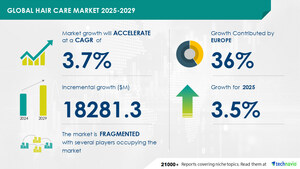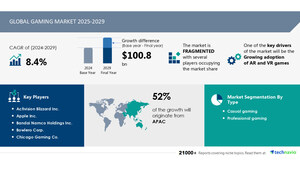NEW YORK, Jan. 24, 2025 /PRNewswire/ -- Report with market evolution powered by AI - The global live music market size is estimated to grow by USD 17.99 billion from 2025-2029, according to Technavio. The market is estimated to grow at a CAGR of 11.2% during the forecast period. Growing demand for live music experiences is driving market growth, with a trend towards rise in adoption of virtual and hybrid live music experiences. However, privacy and security concerns over online ticket booking platforms poses a challenge. Key market players include Alliance Tickets, Bassett Events Inc., Coast To Coast Tickets LLC, CTS Eventim AG and Co. KGaA, Event.com Inc., Eventbee Inc., Eventbrite Inc., Live Nation Entertainment Inc., Lyte Inc., SeatGeek Inc., Sunrise Records Ltd., The Ticketline Network Ltd., Ticket City Inc., TicketNetwork Inc., TickPick LLC, TiqIQ LLC, TodayTix Inc., Viagogo Entertainment Inc., Vivendi SE, and Vivid Seats Inc..
Key insights into market evolution with AI-powered analysis. Explore trends, segmentation, and growth drivers- View Free Sample PDF
Live Music Market Scope |
|
Report Coverage |
Details |
Base year |
2024 |
Historic period |
2019 - 2023 |
Forecast period |
2025-2029 |
Growth momentum & CAGR |
Accelerate at a CAGR of 11.2% |
Market growth 2025-2029 |
USD 17.99 billion |
Market structure |
Fragmented |
YoY growth 2022-2023 (%) |
10.1 |
Regional analysis |
North America, Europe, APAC, South America, and Middle East and Africa |
Performing market contribution |
North America at 35% |
Key countries |
US, UK, China, Japan, Canada, Germany, India, France, South Korea, and Italy |
Key companies profiled |
Alliance Tickets, Bassett Events Inc., Coast To Coast Tickets LLC, CTS Eventim AG and Co. KGaA, Event.com Inc., Eventbee Inc., Eventbrite Inc., Live Nation Entertainment Inc., Lyte Inc., SeatGeek Inc., Sunrise Records Ltd., The Ticketline Network Ltd., Ticket City Inc., TicketNetwork Inc., TickPick LLC, TiqIQ LLC, TodayTix Inc., Viagogo Entertainment Inc., Vivendi SE, and Vivid Seats Inc. |
Live music market is a thriving industry that caters to the worldwide demand for authentic and musical experiences. Trends in this market include live music concerts, mobile apps, and the rise of DJs. Genres such as Blues, Pop, Rock, Metal, Electronica, and more continue to attract diverse audiences. Urbanization and industrial developments have led to an increase in music events, from small clubs to arena shows and stadiums. Customer preferences drive emerging trends like interactive activities, local talent, and food vendors at music festivals. Technology adoption, including automation and production lines, enhances the live music experience. Industrial developments and macroeconomic factors impact ticket sales for B2C enterprises, with gross merchandise value and user metrics key performance indicators. Social media and online purchase platforms have changed how fans engage with artists, managers, agents, promoters, ticketing companies, contractors, record companies, music publishers, corporate brands, and sponsors. Virtual online platforms, holograms, and fan bases continue to shape the live music landscape. Representativeness, social outlook, and disposable incomes influence the success of live music events. Favorable weather conditions, outdoor music events, and passionate audiences create memorable experiences. Risk-taking promoters and production specialists ensure a successful show, managing logistics like lights, audio equipment, stages, transport, insurance, and security. Goldman Sachs predicts that the live music market will continue to grow over the next decades, providing livelihoods for musicians, tours, and festivals. The cornerstone of this industry remains the live performance, connecting like-minded individuals through their shared passion for music.
The live music industry has experienced a notable shift towards virtual and hybrid events due to the impact of technology and the COVID-19 pandemic. With large-scale in-person gatherings becoming difficult or impossible, artists and event organizers have embraced innovative solutions to deliver live music experiences to global audiences. The pandemic disrupted traditional live music landscapes, leading in the adoption of virtual and hybrid formats. These approaches enable musicians and artists to connect with fans despite the challenges posed by the current situation. The use of technology in live music events is now a necessity, allowing for more accessible and inclusive experiences for fans around the world.
Request Sample of our comprehensive report now to stay ahead in the AI-driven market evolution!
• Live music market is a dynamic and ever-evolving industry, encompassing various elements such as concerts, mobile apps, DJs, artists, and genres like Blues, Pop, Rock, Metal, and Electronica. Challenges in this sector include urbanization, production lines, automation, and technology adoption. Industrial developments and macroeconomic factors impact customer preferences and emerging trends, with local special circumstances and social outlook also playing a role. Live music events offer social interaction for like-minded individuals, particularly the younger generation, seeking experiences rather than material possessions. Music festivals cater to diverse genres and audiences, featuring art installations, food vendors, and interactive activities. Local talent thrives in small clubs and theatre-sized venues, while international stars perform in arenas and stadiums. Event organizers, ticket sales, and B2C enterprises drive the industry's Gross Merchandise Value. Consumer behavior, user metrics, and online purchase trends are crucial for modeling approaches. Internet connection speed, representativeness, and social media influence the S-curve function and exponential trend smoothing of internet users and urban population. Live music market players include artists, managers, agents, promoters, ticketing companies, contractors, record companies, music publishers, corporate brands, sponsors, and fan bases. Risk-taking entrepreneurs manage fees, shows, festival dates, tours, and promotional campaigns. Production specialists provide lights, audio equipment, stages, and video screens, while transport, insurance, and security ensure smooth events.
• In the dynamic live music market, businesses utilize online tools to understand customer preferences and deliver customized offerings. Cookies are tracked to gather data, enabling interaction through targeted communications. This data includes customer profiling, behavior, and data mining. However, the indiscriminate use of such information may infringe on customer privacy. Location-based services, which require geo-location data, also raise privacy concerns. As the IT industry fosters a competitive electronic marketplace, it's crucial to ensure secure and reliable transfer and integration of critical information.
Discover how AI is revolutionizing market trends- Get your access now!
This live music market report extensively covers market segmentation by
- Revenue
- 1.1 Tickets
- 1.2 Sponsorship
- 1.3 Merchandising
- Genre
- 2.1 Pop
- 2.2 Rock
- 2.3 Hip-hop
- 2.4 EDM
- 2.5 Others
- Geography
- 3.1 North America
- 3.2 Europe
- 3.3 APAC
- 3.4 South America
- 3.5 Middle East and Africa
1.1 Tickets- The ticketing segment is a pivotal component of the global live music market, facilitating fan access to various music events through ticket sales and distribution. It encompasses concert, festival, and other live music performance tickets. Technology advancements and evolving consumer preferences have significantly transformed the ticketing segment. Online platforms, such as Ticketmaster and StubHub, offer a convenient ticket-purchasing experience with user-friendly interfaces and secure payment gateways. Blockchain ticketing systems, like mobile ticketing, provide secure digital tickets and eliminate the need for physical tickets, enhancing the overall experience and reducing counterfeit risks. Secondary ticketing platforms, including Viagogo and SeatGeek, offer an alternative for fans to buy and sell tickets to sold-out events, despite concerns regarding scalping and inflated prices. Data analytics and personalized marketing strategies are also emerging trends, enabling ticketing companies to provide targeted recommendations and campaigns based on customer preferences and demographics. These factors are expected to boost ticketing segment growth in the live music market.
Download a Sample of our comprehensive report today to discover how AI-driven innovations are reshaping competitive dynamics
Live music concerts continue to captivate audiences worldwide, offering unique experiences for fans of various genres including Blues, Pop, Rock, Metal, Electronica, and more. Mobile apps have revolutionized the way we discover and access live music events, allowing users to stay updated on their favorite artists' tours and festivals. DJs and musicians bring energy and innovation to live performances, keeping the genre fresh and evolving. Customer preferences and emerging trends shape the live music landscape, with local special circumstances and macroeconomic factors also playing a role. Decades-old traditions and newer virtual online platforms coexist, offering livelihood opportunities for musicians and providing opportunities for like-minded individuals to connect. Live music events offer social interaction and a sense of community, with younger generations embracing the cornerstone role of live performance in music culture. Innovations such as holograms and virtual reality further enhance the live music experience, blurring the lines between reality and imagination.
Live music concerts have seen a significant transformation in recent decades, with the integration of technology and mobile apps playing a pivotal role. From DJs spinning tracks at parties to artists performing genres ranging from Blues to Electronica, Rock to Metal, the live music scene is a diverse and thriving industry. Urbanization and industrial developments have led to the automation of production lines, enabling larger music events to take place worldwide. Customer preferences and emerging trends shape the landscape, with local special circumstances and macroeconomic factors also influencing the industry. Live music events offer unique experiences for like-minded individuals, particularly the younger generation. Social media has become a powerful tool for event organizers, driving ticket sales and increasing the reach of B2C enterprises. The Gross Merchandise Value generated from these events is substantial, with user metrics and online purchase data providing valuable insights for modeling approaches. The S-curve function and exponential trend smoothing help illustrate the exponential growth of internet users and the urban population, leading in demand for live music experiences. Representativeness, social outlook, and the livelihood of musicians are all interconnected, with tours, festivals, and virtual online platforms providing opportunities for artists to reach their fan base. Contractors, record companies, music publishers, corporate brands, and sponsors all play a role in the live music ecosystem, with promoters and agents facilitating the performance schedule and territories. Local knowledge and risk-taking are essential for successful events, with fee, show, festival date, and tour all impacting the bottom line. Production specialists ensure the delivery of lights, audio equipment, stages, and video screens, while transport, insurance, and security are crucial logistical considerations. Gigs and entertainment sectors continue to evolve, with holograms and fan bases driving innovation in the industry.
1 Executive Summary
2 Market Landscape
3 Market Sizing
4 Historic Market Size
5 Five Forces Analysis
6 Market Segmentation
- Revenue
- Tickets
- Sponsorship
- Merchandising
- Genre
- Pop
- Rock
- Hip-hop
- EDM
- Others
- Geography
- North America
- Europe
- APAC
- South America
- Middle East And Africa
7 Customer Landscape
8 Geographic Landscape
9 Drivers, Challenges, and Trends
10 Company Landscape
11 Company Analysis
12 Appendix
Technavio is a leading global technology research and advisory company. Their research and analysis focuses on emerging market trends and provides actionable insights to help businesses identify market opportunities and develop effective strategies to optimize their market positions.
With over 500 specialized analysts, Technavio's report library consists of more than 17,000 reports and counting, covering 800 technologies, spanning across 50 countries. Their client base consists of enterprises of all sizes, including more than 100 Fortune 500 companies. This growing client base relies on Technavio's comprehensive coverage, extensive research, and actionable market insights to identify opportunities in existing and potential markets and assess their competitive positions within changing market scenarios.
Technavio Research
Jesse Maida
Media & Marketing Executive
US: +1 844 364 1100
UK: +44 203 893 3200
Email: [email protected]
Website: www.technavio.com/
SOURCE Technavio

WANT YOUR COMPANY'S NEWS FEATURED ON PRNEWSWIRE.COM?
Newsrooms &
Influencers
Digital Media
Outlets
Journalists
Opted In




Share this article